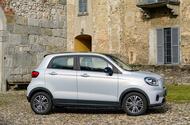Stellantis-backed Chinese firm to "complement" its sibling brands with a range of affordable EVs
New Stellantis brand Leapmotor International won’t cannibalise sales from Citroën, Fiat, Peugeot and Vauxhall, but rather “present new opportunities for cross-shoppingâ€, its CEO said, despite it having broadly similar brand values.
“We consider Leapmotor as complementary to the 14 brands we have in the family, for a number of reasons,†Tianshu Xin said. “Number one, Leapmotor is a pure-EV brand and hailing from China. Number two, it's complementary to what the Stellantis group has [in terms of technology]. Number three, how we position the brand in the family is different.
“For customers who are technology-savvy, maybe younger customers who enjoy technology, there are a lot of other functions. It’s like operating a mobile phone: you have so many functions. Different customers have different preferences from that perspective.â€
Stellantis has invested €1.5 billion (£1.2bn) into the Leapmotor International firm that it has jointly formed with nascent Chinese EV maker Leapmotor, and it’s now leveraging its vast global operations to launch the brand across Europe, Oceania, South-East Asia, India, South America, the Middle East and North Africa, with the expectation that it will increase its sales to 250,000 this year and 500,000 in 2030.
“State-of-the-art technologies and the rapid growth that Leapmotor has been able to achieve in the past several years, plus its strong in-house vertical R&D capabilities and quality, are why we chose Leapmotor to build up this strategic alliance,†Xin said.
Key among this technology is Leapmotor’s ‘cell-to-chassis’ construction method, which, it claims, improves an EV’s battery layout, leaves more space for passengers and increases torsional rigidity (to the benefit of ride and handling), all while reducing production costs – and which, Xin said, could possibly be synergised with other Stellantis brands in the future.
The former PSA executive confirmed that Leapmotor International will launch three more EVs in Europe (including the UK by 2028), after the already-launched Leapmotor T03 city car and C10 family SUV: the B10 compact crossover, which is due to be presented at the Paris motor show, and then what are believed to be an E-segment SUV and a C-segment hatchback.
It also “has a plan†for bringing its extended-range electric vehicle (EREV) technology here, Xin told Autocar, citing huge demand from potential customers for an EV with a “1000km [620-mile] rangeâ€.
An EREV version of the C10 is already on sale in China with a 1.5-litre petrol engine and a 739-mile range on the Chinese test cycle – a powertrain shared with the C11 SUV and C01 saloon.
While the C10 is made at a Leapmotor factory in China and therefore in line to be hit with an 21% import tariff into the EU, the much cheaper T03 is built at Stellantis’s factory in Poland, on the former Fiat 500 production line, apparently for a similar price to the Chinese-market version.
Xin denied that building the T03 within the EU was purely an insurance policy against any future tariffs, saying: “If you look at our target audience, the customer is very price-sensitive. So by localising production, one of the biggest chunks you save is on transportation costs.
"All the decisions made are not just based on one factor but based on a holistic business case assessment. And the end game is to provide a mobility solution to customers around the globe.â€

